On November 18th the BBC News website published a report by the BBC Jerusalem bureau’s Tom Bateman headlined “Autistic Palestinian teen’s killing casts spotlight on Israel tactics” which was discussed here.
Fifteen days later, on December 3rd, that ‘spotlight’ theme – apparently intended to convey to BBC audiences that a specific incident reveals something bigger – returned in the headline to another report from Bateman titled “West Bank footage throws spotlight on Israel’s use of lethal force”.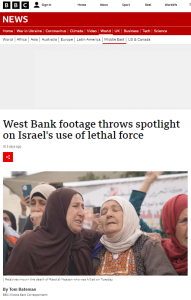
The November 29th incident in al Mughayyir which is the subject matter of Bateman’s article had already been reported by the BBC News website on that day. Bateman’s return to that topic just four days later is explained by what he presents as “video evidence”: [emphasis added]
“Israeli troops had entered the village warning of plans to demolish a Palestinian home.
Footage shows a group of men and teenagers throwing rocks – then pulling back – as two shots ring out.
Raed al-Naasan runs around a corner and collapses, blood seeping into his top, fatally wounded.
He was killed on Tuesday – one of four Palestinians shot dead by Israeli troops during confrontations in different villages that day in the occupied West Bank.
And now that footage of his killing is throwing a fresh spotlight on Israel’s use of lethal force, as violence in the region reaches levels unmatched in years.
In the hours after his death the army said soldiers used live ammunition in response to a suspect “spotted hurling Molotov cocktails [petrol bombs]” at them.
But video evidence and eyewitnesses suggest this wasn’t the case when he was struck.”
Interestingly, that “video evidence” is not provided to readers of Bateman’s written report. Neither does Bateman clarify at any point who filmed it or who gave it to the BBC.
He does however amplify talking points from an inadequately presented political NGO:
“Campaigners from the Israeli human rights group B’Tselem are currently probing Mr Naasan’s death, saying that a significant number of cases of protesters being shot dead this year amount to “excessive use of force“.” […]
“Dror Sadot from B’Tselem, the human rights group, described 2022 as an “extreme year” in terms of Palestinian fatalities.
“There are many cases of protests where the Palestinians are using rocks, stones and sometimes other means, and Israel’s army almost always uses disproportionate force,” she said.
The IDF rejects this, routinely saying it carries out internal investigations into Palestinian fatalities. But human rights groups have described such inquiries as a “whitewash”.”
Bateman gives his description of the video which readers cannot view for themselves:
“Video given to the BBC filmed for nearly a minute before the shooting shows the group, including Mr Naasan, appearing to pick up stones from the street and throw them towards troops who are not visible in the footage. None can be seen throwing petrol bombs. Mr Naasan then stands in front of his family home apparently holding stones, when two gunshots can be heard. The second is thought to be the shot which left him fatally wounded.”
Bateman did however post a 36-second video on his Twitter feed which, as can clearly be seen, has been edited at 0:07 and 0:26. The same footage (parts of which at least were to be found on Palestinian social media networks) appeared in a filmed report aired on the BBC World TV channel on December 3rd in which Bateman told viewers that:
“Troops had gone in over plans to bulldoze a home with no building permit. Relatives documented what then unfolded. The army said soldiers used live fire, responding to a suspect who threw petrol bombs. But video given to the BBC contradicts that.”
The same messaging was promoted in an audio report by Bateman which was aired on the BBC World Service radio programme ‘Weekend’ (from 41:12 here) and repeated on the same station’s ‘Newshour’ programme (from 45:07 here) as well as on BBC Radio 4’s ‘Today’ programme (from 21:39 here).
All of Bateman’s reports include the promotion of claims from al-Naasan’s mother and a Palestinian paramedic whose timely presence at the specific location is not explained:
“Paramedic Mujahid Abu Aliya rushed to treat him at the scene.
“No-one threw a Molotov cocktail, I was here…. When I picked him up he was screaming: ‘I will die, I will die’,” he said.
Mr Naasan’s mother Fatma described how she ran after him moments later desperately trying to help.
“[The troops] are the ones who attacked us – they came towards the house in the confrontations and the young people participated,” she told the BBC shortly after her son’s funeral.”
The sole response from any Israeli party is presented by Bateman in the written report in just two paragraphs:
“In a statement the IDF said: “Only a portion of the event is depicted in the video. IDF soldiers encountered violent rioters… among them the deceased.”
“The man hurled a Molotov cocktail at the forces, who opened fire in response. The circumstances of the event are being examined.””
In the filmed version, that response was presented one sentence:
“In a statement, the Israeli military said only a portion of the event is depicted in the video, reiterating that a Molotov cocktail was thrown.”
The written report notes that Raed al-Naasan was a member of the Palestinian Authority security forces:
“Mr Naasan had recently finished his studies and was training as an officer in the Palestinian Authority security services, the internationally-backed force that carries out internal policing in parts of the West Bank.”
Bateman appears not to have been interested in the question of why a member of the PASF – which is obliged under the terms of the Oslo Accords to act against terrorism – was taking part in what he had earlier described as follows:
“Mr Naasan, 21, was shot dead after a group of around 20 young men and teenagers gathered and threw stones towards the jeeps and soldiers.”
In the filmed and audio reports, Bateman made interesting use of the word “slipping” to describe a topic he and his colleagues have been avoiding for months:
“He was a 21-year-old, in training with the official Palestinian Authority’s security forces. Its control has been slipping in parts of the West Bank.”
In addition to the usual partial BBC portrayal of ‘international law’ – “Settlements are seen as illegal under international law” – Bateman states:
“Under international law, the use of firearms by security forces against civilians is defined as a measure of last resort, and can only take place to stop an “imminent threat of death or serious injury”.”
The point of Bateman’s multiple cross-platform reports is of course to persuade BBC audiences that in this particular case, no such imminent threat existed and to amplify the claim promoted by B’tselem and other politically motivated actors whereby “Israel’s army almost always uses disproportionate force”.
In order to make that point, Bateman was quite happy to set aside journalistic values of transparency and to base his written, audio and filmed reports on edited video footage from sources that he is not prepared to reveal.
BBC editorial guidelines on accuracy include a section titled “Material from Third Parties”: [emphasis added]
“3.3.14 We should only broadcast material from third parties who may have a personal or professional interest in its subject matter if there is an editorial justification. The source of this material should be identified. This includes material from the emergency services, charities and environmental groups.
We should be reluctant to use video and audio or other similar material from third parties. We do not normally use extracts from such material if we are capable of gathering it ourselves. The editorial significance of the material, rather than simply its impact, must be considered before it is used. If it is editorially justified to use it then we must explain the circumstances and clearly label the source of the material in our output.”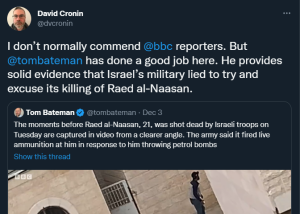
Nevertheless, Bateman’s reporting was repromoted by the BBC’s Middle East editor, a Gaza Strip based propaganda outfit and professional anti-Israel activist Ben White, in addition to being commended by an editor at the extremist anti-Israel ‘Electronic Intifada’.
That, of course, speaks volumes about Bateman’s long evident slide from journalist to political activist.
Related Articles:
BBC FRAMING OF PALESTINIAN TERROR AND VIOLENCE CONTINUES TO FAIL AUDIENCES
BBC NEWS CONTINUES TO SKIRT THE BACKGROUND TO EVENTS IN JENIN
BBC PROMOTES ‘CHICKEN AND EGG’ NARRATIVE ON JENIN
BBC NEWS STILL AVOIDING THE ISSUE OF LACK OF PA GOVERNANCE
WHY THE BBC NEEDS TO UPDATE ITS FATAH PROFILE
GUARDIAN “JOURNALIST” DAVID CRONIN TRIES TO ARREST AVIGDOR LIEBERMAN WHILE HURLING ABUSE AT ISRAEL

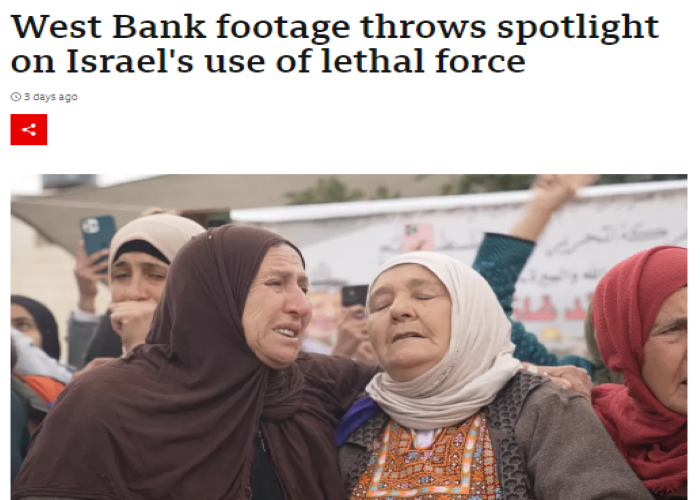

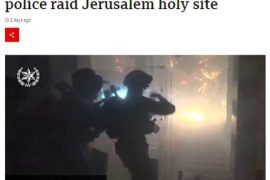
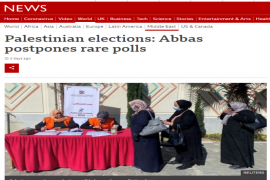
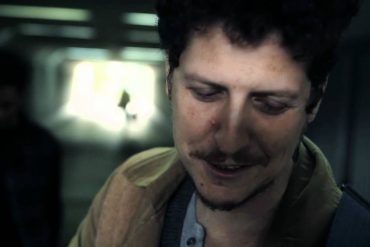
Checking on the link https://twitter.com/BowenBBC/status/1599458571036413952?s=20&t=xH6FtYX9eDVzCN19LFvkaA it is stated Bowen is the BBC International Editor.
If so why is he being involved in Mid East Reporting/Comments?
Same old same old, Bateman enacts his usual pantomime philosophy of not letting the audience know the full and true facts and even neglects to show the ‘evidence’ in support of his anti-Israel reporting. Everyone with as little as half a brain knows that B’tselem is also an anti-Israel organization who will do, say or print anything to make Israel look bad in the eyes of the world. Bateman is a disgrace to the journalistic profession. #defundthebbc